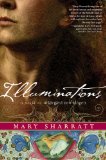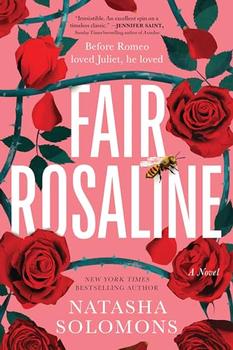Summary | Excerpt | Reading Guide | Reviews | Beyond the book | Read-Alikes | Genres & Themes | Author Bio

A Novel of Hildegard von Bingen
by Mary SharrattSkillfully interweaving historical fact with psychological insight and vivid imagination, Sharratt's redemptive novel, Illuminations, brings to life one of the most extraordinary women of the Middle Ages: Hildegard von Bingen, Benedictine abbess, visionary, and polymath.
Offered to the Church at the age of eight, Hildegard was entombed in a small room where she was expected to live out her days in silent submission as the handmaiden of a renowned but disturbed young nun, Jutta von Sponheim. Instead, Hildegard rejected Jutta's masochistic piety and found comfort and grace in studying books, growing herbs, and rejoicing in her own secret visions of the divine.
When Jutta died some thirty years later, Hildegard broke out of her prison with the heavenly calling to speak and write about her visions and to liberate her sisters and herself from the soul-destroying anchorage.
Riveting and utterly unforgettable, Illuminations is a deeply moving portrayal of a woman willing to risk everything for what she believed.
She is so bright and glorious that you cannot look at her face or her garments for the splendor with which she shines. For she is terrible with the terror of the avenging lightning, and gentle with the goodness of the bright sun; and both her terror and her gentleness are incomprehensible to humans. . . . But she is with everyone and in everyone, and so beautiful is her secret that no person can know the sweetness with which she sustains people, and spares them in inscrutable mercy.
—Hildegard von Bingen's vision of the Feminine Divine, from Scivias,
III, 4.15, translated by Mother Columba Hart, O.S.B., and Jane Bishop
Prologue: Apostate
Rupertsberg, 1177
THE MOST ANCIENT and enduring power of women is prophecy, my gift and my curse. Once, centuries before my existence, there lived in these Rhineland forests a woman named Weleda, she who sees. She took no husband but lived in a tower. In those heathen times, her people revered her as a goddess, for she foretold their ...
Deftly written, this novel places the reader fully into Hildegard's life and time with fully rounded characters, the historical backdrop of the Crusades and the ongoing struggle of women to overcome the social roles expected of them...continued
Full Review
 (718 words)
(718 words)
(Reviewed by First Impressions Reviewers).
 C. W. Gortner, author of The Confessions of Catherine de Medici
With elegance and sensitivity, Mary Sharratt rescues Hildegard von Bingen from the obscurity of legend, bringing to life the flesh-and-blood woman in all her conflict, faith, and unwavering tenacity. Illuminations is an astonishing revelation of a visionary leader willing to sacrifice everything to defend her beliefs in a dangerous time of oppression.
C. W. Gortner, author of The Confessions of Catherine de Medici
With elegance and sensitivity, Mary Sharratt rescues Hildegard von Bingen from the obscurity of legend, bringing to life the flesh-and-blood woman in all her conflict, faith, and unwavering tenacity. Illuminations is an astonishing revelation of a visionary leader willing to sacrifice everything to defend her beliefs in a dangerous time of oppression. Karleen Koen, author of Before Versailles and the best-selling Through a Glass Darkly
I love Mary Sharratt. The grace of her writing and the grace of her subject combine seamlessly in this wonderful novel about the amazing, too-little-known saint, Hildegard of Bingen, a mystic and visionary. Sharratt captures both the pain and the beauty such gifts bring, as well as bringing to life a time of vast sins and vast redemptions.
Karleen Koen, author of Before Versailles and the best-selling Through a Glass Darkly
I love Mary Sharratt. The grace of her writing and the grace of her subject combine seamlessly in this wonderful novel about the amazing, too-little-known saint, Hildegard of Bingen, a mystic and visionary. Sharratt captures both the pain and the beauty such gifts bring, as well as bringing to life a time of vast sins and vast redemptions. Margaret George, author of Mary, Called Magdalene
An enchanting beginning to the story of the perennially fascinating 12th-century mystic, Hildegard of Bingen. It is easy to paint a picture of a saint from the outside but much more difficult to show them from the inside. Mary Sharratt has undertaken this with sensitivity and grace.
Margaret George, author of Mary, Called Magdalene
An enchanting beginning to the story of the perennially fascinating 12th-century mystic, Hildegard of Bingen. It is easy to paint a picture of a saint from the outside but much more difficult to show them from the inside. Mary Sharratt has undertaken this with sensitivity and grace. Sharon Kay Penman, author of the New York Times bestseller Time and Chance
I loved Mary Sharratt's The Daughters of Witching Hill, but she has outdone herself with Illuminations: A Novel of Hildegard Von Bingen. She brings one of the most famous and enigmatic women of the Middle Ages to vibrant life in this tour de force, which will captivate the reader from the very first page.
Sharon Kay Penman, author of the New York Times bestseller Time and Chance
I loved Mary Sharratt's The Daughters of Witching Hill, but she has outdone herself with Illuminations: A Novel of Hildegard Von Bingen. She brings one of the most famous and enigmatic women of the Middle Ages to vibrant life in this tour de force, which will captivate the reader from the very first page.St. Hildehard von Bingen was an incredibly gifted writer and music composer. Her music is known for its soaring registers and flourishes. As a child, she was exposed to music at the monastery when she heard others take part in the Divine Office. She listened and learned from the interplay between words and sound. The monastery provided a forum for music composition with copyists who could pen the music and a skilled group who could sing it.
The saint believed music was the highest form of human activity and collected them as a complement to traditional Gregorian chants.
A Paris-based ensemble group, Sequentia, has revived the popularity of St. Hildegard von Bingen's music. Sequentia's work on the music has been recorded on seven releases ...

If you liked Illuminations, try these:

by Natasha Solomons
Published 2024
The most exciting historical retelling of 2023: a subversive, powerful untelling of Romeo and Juliet by New York Times bestselling author Natasha Solomons.
Was the greatest ever love story a lie?

by Joel H. Morris
Published 2024
A propulsive and piercing debut, set ten years before the events of Shakespeare's historic play, about the ambition, power, and fate that define one of literature's most notorious figures: Lady Macbeth.




Idealism increases in direct proportion to one's distance from the problem.
Click Here to find out who said this, as well as discovering other famous literary quotes!